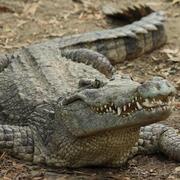
Ancient crocodiles were more diverse than modern crocodiles due to rapid evolution. Modern crocodiles live in rivers, lakes and wetlands, but ancient crocodiles flourished on land and in the oceans. Some even adopted dolphin-like adaptations to living in oceans, while others lived on land as plant eaters.
Stephanie Pierce, Thomas D. Cabot Associate Professor of Organismic and Evolutionary Biology and Curator of Vertebrate Paleontology in the Museum of Comparative Zoology, co-authored the study in Proceedings of the Royal Society B led by University of Bristol.
Researchers examined over 200 skulls and jaws, including fossils from the entire 230-million-year history of crocodiles and their extinct relatives. They also studied shape variation to find differences between species and how fast crocodile groups changed over time.
The team found extinct crocodile groups evolved very fast over millions of years, undergoing great changes to their skulls and jaws. The study also showed that living crocodiles -- crocodiles, alligators and gharials -- are more conservative and have evolved steadily for the last 80 million years. However, they are not slowing their evolution and are no longer considered 'living fossils'.
"Ancient crocodiles came in a dizzyingly array of forms. They were adapted to running on land, swimming in the water, snapping fish, and even chewing plants," said Pierce. "Our study shows that these very different ways of living evolved incredibly fast, allowing extinct crocodiles to rapidly thrive and dominate novel ecological niches over many millions of years."
Lead author Dr Tom Stubbs, a Senior Research Associate at the University of Bristol's School of Earth Sciences, said: "Crocodiles and their ancestors are an incredible group for understanding the rise and fall of biodiversity. There are only 26 crocodile species around today, most of which look very similar. However, there are hundreds of fossil species with spectacular variation, particularly in their feeding apparatus."
University of Bristol EurekAlert!, Tom Stubbs
